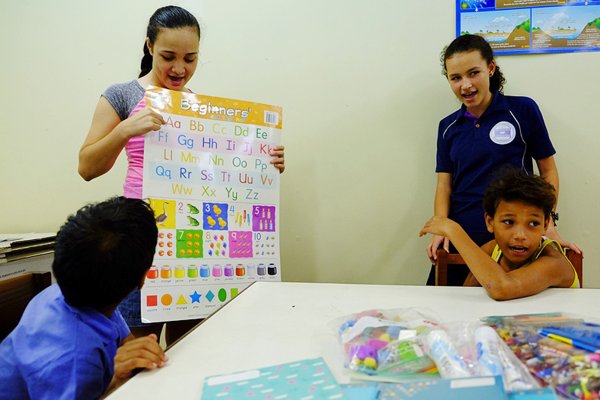Samoa: Walking the talk and making a difference
Samoa/ Abril de 2016/Samoa Observer
Resumen; Algunas personas encuentran molestos los vendedores ambulantes que deambulan por Samoa. Pero a los 14 años de edad, Quenjule Slaven de Moamoa no los ve de esa manera. Ella los ve como futuros líderes, hombres y mujeres jóvenes que sólo necesitan tener la oportunidad de aprender, es por esto que realizo un programa para ayudarlos, de allí comenta que «Estas personas son la columna vertebral y el corazón del programa y las cosas serían muy difícil sin ellos.»
Some people find street vendors annoying.
As the faces of hardship and poverty in Samoa, they are often ridiculed and frowned upon.
But 14-year-old Quenjule Slaven from Moamoa does not see them that way. She sees them as future leaders, young men and women who only need to be given an opportunity to learn.
So 11 weeks ago, Quenjule initiated a programme with the intention of teaching street vendors how to read. The programme started with a couple of children but it now has close to 20 children, many of them who don’t have the opportunity to study.
When Samoa Observer visited the programme, Quenjule was busy, pouring her heart out to the children.
Her passion is quite obvious. Asked for an interview, she politely said: “One minute please, I want to finish teaching my students first.”
So how did it start?
“It all started when I was in town and I would always see child vendors everywhere instead of being in school getting an education for a brighter future,” she said.
“I saw them at McDonald’s and Sunrise restaurant; I asked my mom ‘mom why aren’t they in school?’ and she said because their parents can’t afford it and these kids support and provide for their families.”
Not knowing the question she just posed was a germinating Good Samaritan seed, she continued on with life.
“After I participated in the human rights poster competition sponsored by the Ombudsman I realized that these kids also have human rights,” she said.
“The right to an education, the right to have a voice on the issues in their lives; and so my parents helped me, they were my inspiration.
“Once we decided what to do we came here and asked the manager of the library if we could use their facilities and once they approved we began the following Monday.”
Programme attendance began small but Quenjule was happy nevertheless.
“At first there were about five kids who showed up and were eager to learn, now we have many more” she said. “The kids didn’t know their dates of birth, they didn’t know how to spell their name, they didn’t know the alphabet but after just two weeks, they started to gain that sense of trust in us and so the fun began.
“Our main goal is to make reading fun for them so that they will continue to read and then in the end they would have that chance at a brighter future.
“We want to pull them off the streets so that when they grow up they know the value of education leading to them putting their future children in school which will break the chain of child vendors in Samoa.” When asked about the progress of her students Quenjule replied.
“They are doing very well; we just started up again yesterday because we had a 2 week holiday and there are about 16-18 children on average who attended before the break,” she said.
“A girl named Sulu was not ok with reading, she was shy and lacked confidence but now she shows so much enthusiasm when reading and she even took the initiative to learn her full A, B, C’s over the weekend.”
Quenjule continued with a message for the many people who complain about street vendors rather than try help.
“I feel that it is important to walk the talk; we shouldn’t get drawn in to only speaking about the problem but instead we need to act on fixing it,” she said.
“Martin Luther King once said ‘faith is taking the first step even when you don’t see the whole staircase’ it’s not about how bad the situation is; it’s what we do about it that matters most.
“I know that these children have a hard time on the streets, but I believe we all have the ability to turn each and every one of their lives around.”
Each of the children gather at certain locations where volunteers Fana and Soli pick them up and bring them to the Nelson Library, after each lesson they are given some food and juice before being dropped off home.
According to Quenjule none of this would have been possible without help from some special volunteers.
“I want to thank the following people who have volunteered their time to help this programme grow to what it is today: My supportive parents Juliann and Christian Slaven, Fana Lee Zumba, Soli, Lomia, Maima, Tanya and her daughter Amelia, Judge Vui and his wife for financial donations and great advice for the programme, Lorraine Williams, Stella M, Maiava Iulai Toma and the Ombudsman Staff,” she said,
“These people are the backbone and heart of the programme and things would be really hard without them.”
The programme runs every Mondays and Tuesdays at around 3:30pm at the Nelson Memorial Public Library.
Fuente: http://www.samoaobserver.ws/en/21_04_2016/local/5201/Walking-the-talk-and–making-a-difference.htm
Foto: http://www.samoaobserver.ws/images/cache/600×400/crop/images%7Ccms-image-000006013.jpg








 Users Today : 0
Users Today : 0 Total Users : 35460209
Total Users : 35460209 Views Today :
Views Today :  Total views : 3418895
Total views : 3418895